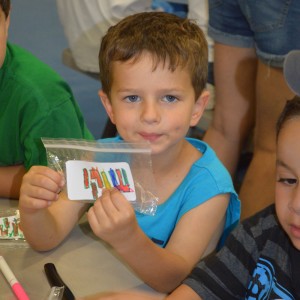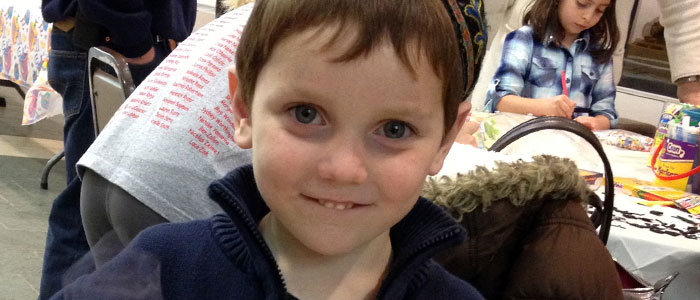Eli Ostroff is only five years old, but he is about to begin an adventure that will not only be incredibly fun, it’s likely to benefit his math skills, his cognitive abilities and his use of the English language – along with creating a profound connection to the State of Israel.
Eli, of West Bloomfield, will be one of 24 children attending the new Hebrew Immersion Program this summer at the Jewish Community Center of Metropolitan Detroit’s Center Day Camps in West Bloomfield.

The eight-week program will provide children with a full camp experience, everything from sports to swimming, arts to singing. But instead of English, the entire day will be in Hebrew: conversations with friends, instructions for learning a new game, the daily schedule.
Children do not need to know any Hebrew to participate.
“Israel always has been an important part of our summer camp,” said Center Day Camps Director Tal Siegmann. “With programming, celebrations and Israeli counselors, we want to bring a fun and meaningful taste of Israel to camp. “Now we are proud to offer this pilot program that will give kids a totally immersive Hebrew language experience.”
Center Day Camps is one of only four camps nationwide that will offer the Hebrew Immersion Program. Available to students in grades K-2, the program allows students the chance to learn, understand and speak Hebrew naturally, by listening to and engaging in daily conversation with their counselors and peers. From the moment camp begins, all aspects of the day will be conducted solely in Hebrew, giving kids an opportunity to gain proficiency as they participate in all their favorite activities.
Jennifer Ostroff, Eli’s mom, knew this would be the perfect program for her son. “I am really excited about it!” she said. Numerous factors inspired Ostroff to enroll Eli in the program. Five years ago her brother made aliyah, and she began reflecting on the fact that no one in her family could really speak Hebrew. Her mother-in-law knew Yiddish, but none of her children learned the language – a loss they feel to this day. Studying a new language is excellent for brain development, she noted. And she believes strongly in the “immediate connection” to Israel that comes when you know Hebrew.
There’s Sunday school, of course. But usually Sunday school focuses on learning biblical Hebrew – the Hebrew of prayers and reading and learning. Conversational Hebrew allows children to be part of a living language – the language of the Torah, but also of Israeli rock stars like Shy Nobleman, Noa and Yoni Bloch; the language of the Israel Defense Forces; the language spoken in department stores, in films and on the streets in Tel Aviv, Jerusalem and Eilat.
Key to the program will be staff.
Siegmann is in the process of hiring counselors, unit heads and specialists who are fluent in Hebrew, love working with children and understand the importance of Jewish camping.
Camp typically works with the Jewish Agency for Israel when hiring schlichim, Israeli emissaries who serve as summer camp staff. For the Hebrew Immersion Program, the Jewish Agency conducted additional interviews to identify individuals with a teaching background. Siegmann then selected his final candidates, “all of whom have the right background and approach,” he said. This includes four Israelis and two Americans who are not only fluent in Hebrew, but have a perfect Israeli accent.
At the end of the Hebrew Immersion Program, participants will have the chance to keep up their language skills with regular programs at the JCC. According to Siegmann, Center Day Camps will host weekly events, with a fun camp feel, like playing games and making sufganiot (jelly donuts) for Chanukah, where everything spoken will be in Hebrew.
“There are many benefits to this program,” Siegmann said. “It helps children develop important learning skills, and it is the perfect start for any child who will continue with a Jewish Hebrew education, whether in a day school or Sunday school, or who wants to establish a deeper connection to Judaism.”
Learning a second language in childhood also helps develop cognitive and listening skills, according to numerous studies, notably the Armstrong and Rogers 1997 report: “Basic Skills Revisited: The Effects of Foreign Language Instruction on Reading, Math, and Language Arts.” Learning a second language further boosts a student’s memory, appreciation for his own language and can significantly improve children’s skills on core subjects such as math and social studies.
Presented with support from the Areivim Philanthropic Group, the Center Day Camps Hebrew Immersion Program will begin June 23 and continue until August 15. For information or to register, visit us wbcamp.jccdet.org or call (248) 432-5578.




